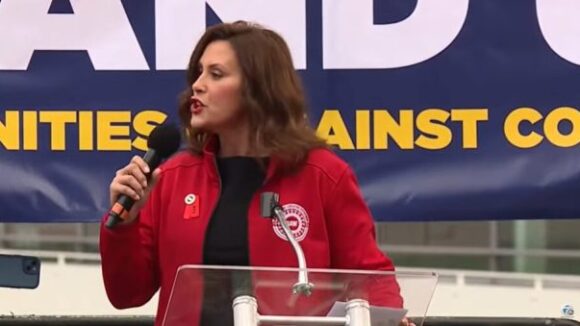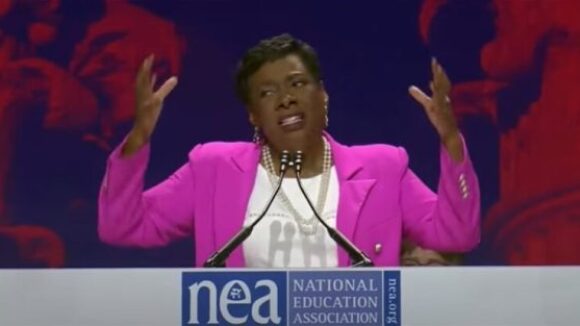Tyranny Triumphs in the Great Lakes State
Ignoring ample evidence of forced unionism’s unfairness and its damaging impact on jobs and incomes, Big Labor Michigan Gov. Gretchen Whitmer signed Right to Work destruction in 2023.

Government AND Private Employees’ Right to Work
‘Clothed With’ Sovereign Power, Big Labor Tramples Free Speech
Thanks to the remarkable Right to Work U.S. Supreme Court victory in Janus v. AFSCME Council 31 (see page one for more information), compulsory employee financial support for government-sector unionism is no longer legal anywhere in America.
Of course, a great deal of Right to Work legislative and legal action is now needed, and will be needed for some time to come, to ensure civil servants can actually exercise the First Amendment rights the High Court has ruled are theirs.
But in the [23] states that still lack Right to Work protections in the private sector, Big Labor retains the power, at this time, to force employees with impunity to bankroll union-boss speech with which the employees disagree.
Union Bosses’ Coercive Power Over Private Employees ‘Not Unlike That of a Legislature’
Under U.S. Supreme Court precedents going back nearly 75 years, the monopoly-bargaining privileges union officials receive via the National Labor Relations Act (NLRA) and the Railway Labor Act (RLA) render those officials subject to constitutional constraints.
The two federal statutes define specific conditions under which an employer must recognize a particular union as the “exclusive bargaining agent” for all the front-line workers, including union members and nonmembers alike, in a business or other “bargaining unit.”
In his 1944 Supreme Court opinion in Steele v. Louisville & Nashville Railroad, Chief Justice Harlan Stone found that, under the RLA “a union is clothed with power not unlike that of a legislature . . . .”
Consequently, if the RLA actually permitted the forging of racially discriminatory contracts, as the railroad-company and union-boss respondents in the case contended, the statute would violate the Fifth Amendment rights of the employees who lost their jobs.
The Steele court allowed the RLA to stand only by concluding, somewhat creatively, that the law tacitly barred union bosses from using their government-granted monopoly power to force African- American workers out of good jobs.
Unfortunately, in practice, Steele did little to prevent Big Labor-instigated racial job discrimination.
But it did at least establish that whenever union bosses are “clothed with power” akin to that of legislators, Big Labor must not be allowed to wield that power to trample employees’ constitutional rights.
Legislators, and Not Only Judges, Have a Duty to Uphold the Constitution
When private-sector union bosses wield their government-granted monopoly-bargaining privileges to extract an agreement from an employer forcing independent-minded employees to pay dues or fees to a union as a job condition, the constitutional rights of those employees are violated.
National Right to Work Committee Vice President Greg Mourad commented:
“Janus addresses only forced employee financial support for union-boss speech ‘directed at the government,’ and consequently does nothing to stop ongoing Big Labor attacks against the First Amendment freedom of millions of private-sector employees.
“Fortunately, contrary to the mistaken notion of many people inside Washington, D.C.’s Beltway, judges are not the only people who have the authority to redress constitutional wrongs.
“Lawmakers and chief executives also have, under an array of circumstances, the ability and the duty to protect the Constitution.”
The National Right to Work Act, legislation already introduced in the U.S. House (as H.R.785) and the U.S. Senate (as S.545), would prohibit the termination of private-sector employees covered by the NLRA or the RLA for mere refusal to join or bankroll a union they didn’t ask for, and don’t want.
“I hope Congress will be inspired by the Supreme Court’s June 27 decision in Janus to take up and vote on H.R.785 and/or S.545, which would stop Big Labor from exploiting the NLRA or the RLA to force employees to pay union dues, or be fired,” said Mr. Mourad.
“The fact is, private employees’ Right to Work is no less deserving of legal protection than is the Right to Work of government employees.
“Pro-Right to Work citizens won’t be satisfied until every American employee is free of forced unionism.”

Ignoring ample evidence of forced unionism’s unfairness and its damaging impact on jobs and incomes, Big Labor Michigan Gov. Gretchen Whitmer signed Right to Work destruction in 2023.

Largely thanks to the Right to Work attorney-won U.S. Supreme Court decision in Janus v. AFSCME, union bosses like NEA President Becky Pringle are no longer able to block virtually all meaningful education policy reforms.

Avelo employee Kim Howard believes all the firm’s flight attendants should get to vote on continued AFA rule. Credit: WTNH-TV (ABC,…